The Breeders’ Cup World Championships are just around the corner and will begin on November 1 with Stars of Tomorrow, featuring five races for two-year-olds. The minimum prize is $1 million. Main Event of the November Nine Championship. $2 million to $7 million Breeders’ Cup Classic. The Cup takes place where turf and surf meet at Southern California’s iconic Del Mar Raceway. Ahead of the two biggest days of racing in North America, the Daily Racing Form provides complete coverage of every race. The best piece of DRF reporting is DRF reporter Mike Welsh’s Clocker Reports. At Del Mar, Welsh watches horses prepare for racing and provides great insight into how horses are trained based on his extensive experience as a clockmaker. A good example of the value of listening to Welsh’s reports came last year when he suggested not buying the hype around Tamara for Breeders’ Cup minor fillies.
Tamara was one of the big events before the Cup. Trained by Richard Mandella, he had impressive wins on both starts, including an easy win on his Grade 1 debut. The hypo was huge because it came from Beholder, one of the best dogs of all time. The daughter of Henny Hughes won 18 races, finished first among boys in the Grade 1 Pacific Classic and capped her career with a thrilling victory over Songbird in the Breeders’ Cup Distaff. Wales was upset when he saw Tamara working Santa Anita. Most people who saw the move agreed with it. “I didn’t like the ending,” Welsh said. “I feel like I’m lacking energy. He should have easily caught up with the other horses, but he didn’t. “I liked the way Bill Mott’s horse ran, so I thought it would be a good bet.”
He was talking about Just F Y I, who paid $16 to take Jody’s pride and win a 16 mile race. Tamara was sent off as the favorite and finished out of the money. Welsh became interested in horse racing while attending college in Boston. His roommate had a cousin who worked at Suffolk Downs, and when he wasn’t studying, he went to the now-defunct track. “I loved it,” Wales said. “I didn’t gamble much, but I think I did pretty well.”Coincidentally, the Welshman began his horse racing career in 1972. He was attending Boston University School of Journalism and had to do an internship to get his degree. He tried to get a job at several local newspapers, but was unsuccessful. “No one was hiring, so we asked experts if internships in racing uniforms would work,” Welsh said. “He said it would be great if I wrote something.”Welsh eventually moved to Miami, where he has been an analyst and columnist for DRF since 1993.
“It changed into a coin that started six or seven years later,” he said. “We started this with a friend and we did it ourselves.”Welsch, along with a team of watchmakers working for Racing Form, currently produce watchmaker reports for some of the country’s top circuits. His good work led to racing uniforms and he was asked to prepare a watchmaker’s written report on horses prepared for the Kentucky Derby and Cup. Now, in addition to written reports, we also produce video reports. What he sees at Del Mar is how the horses finish their training. For European horses running on dirt for the first time, let’s see how well they hold onto the surface. The most notable city is Troy, one of the most popular cities in the classics. “I’m more interested in how they get things done and how they work,” he said. “One of the best workouts I’ve ever seen was Rachel Alexandra before the Derby.
“Unfortunately, he ran in the Oaks and came back to beat Mine That Bird in the Preakness, the Derby winner. “It would be a great prize if he played in the derby.”Welsh began his training reports earlier this week and they can be viewed on drf.com. This weekend many horses will be busy with final preparations for the races. While in Del Mar, Hastings Racecourse opens at 9 a.m. on both days, and ticket offices open at 10 a.m. On Saturday, the Royal George Hall opens at 9.30am and the ticket office opens at 11am.
















































